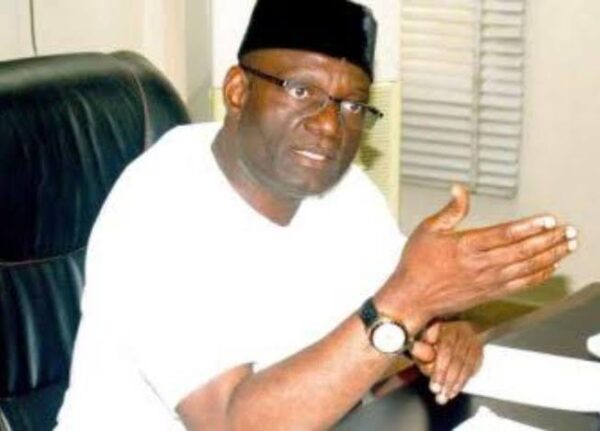By Frank Odinukaeze

The Federal Government has made it clear that the Nigerian Shippers’ Council (NSC) is the Port Economic Regulator(PER).
The Permanent Secretary,Federal Ministry of Transportation,Mrs Magdalene Ajani who represented the Minister of Transportation Mu’azu Sambo, stated this Friday, at the sensitization seminar on promoting Competitiveness In the Maritime Industry:

Ajani noted that the port was without a clear economic regulator prior to the appointment of the NSC.”It is noteworthy that prior to appointment of the Council,as economic regulator there was no known authority saddled with the responsibility of checkmating the commercial activities at the ports. It will be recalled that the nation’s port prior to 2014 under the port concession agreement were at the lowest level of efficiency,with high vessel turn around time, increased container dwell time ,high clearing costs ,dearth of infrastructure,lack of investment and other sundry issues ,hence the need to fill the vacuum and address the issues bedeviling the ports.”
Ajani explained that the major objective of government in appointing the NSC as the interim economic regulatory agency was to create an effective regime at the ports for the control of tariffs,rates charges and other related economic services.By virtue of the port economic regulatory order 34 of 2015 ,issued by the president in pursuance to section 5 and 105 of the 1999 constitution as gazetted .The port economic order as gazetted has provided the various options and roles in line with the provisions of section 3(b) (f) and (j) of the Nigeria Shippers’Council Act ,Cap 133,Laws of the Federation 2004.

She noted that the Port Economic Regulator order 2015 ,clearly spelt out the providers of services at the ports.

“I will like to use this opportunity to enjoin you all to pick a copy of the NSC economic regulator order 2015 and get yourselves conversant with all its provisions”she said.
Ajani noted that various stakeholders have expressed their commitment and cooperation to the council for the successful implementation of the regulation.
“I therefore wish to reiterate the position of government that the Nigerian Shippers’ Council (NSC) is the port economic regulator and I enjoin all stakeholders in the maritime Industry to give the council the needed support on the execution of this mandate.
Earlier in his welcome address,the Executive Secretary and Chief Executive Officer (CEO) of the NSC, Mr Emmanuel Jime noted that the maritime industry
plays an important role in the development of any economy. “As a catalyst to the nation’s economic development, maritime transportation and its related activities influence the growth of industries directly or indirectly and exerts great influence on the general price of goods and services” he sad.
He said With the concession of ports in 2006, cargo throughput substantially increased. However, globally West and Central African sub-regions still have the least cargo volumes.
Jime noted that one of the reasons for the trade imbalance, is the composition of sub Saharan African Trade which is about 6% of global trade. Further about 70% of export cargoes are primary commodities while majority of imports are consumer goods.
“Therefore, there is the need to develop the nation’s industrial base so as to balance trade and boost the nation‘s economy. The port as a critical infrastructure need to be made competitive, guard against monopoly and free for numerous players to enter and exit in order for its users to enjoy the benefit of lower prices and efficient service delivery usually associated with competition”he added.
He said that it is against this back drop, that the Federal Government in pursuant to the Nigerian Shippers Council Act Cap N133 LFN 2004 appointed NSC as Ports Economic Regulator. The aim is to create an effective regulatory regime at Nigerian ports for the control of tariffs, rates, charges and other related economic services.
” The NSC, in the performance of this mandate, developed and implemented a strategic plan which is assessed and reviewed every (three) 3 years” he said
He noted that the NSC has made some accomplishments which include the following:
Cost moderating exercise by constant engagement with the service providers to ensure that their tariffs and charges are tied to services rendered.
Provision of guidelines for setting tariffs, rates and charges to guard against arbitrariness and ensure that the port operates competitively,
Promotion and development of transport infrastructure such as Inland Dry Ports (iDPs)and Vehicle Transit Areas (VTAs) to facilitate cargo delivery to hinterland destinations;
Establishment of machineries for monitoring compliance with set Operational standards.
Others include embarking on the registration of regulated service providers and users in line with the policy of Know-Your Customer (KYC).
Establishment of a complaint resolution desk to address and attend to complaints from both service providers and users.
He sought for the support and collaboration of all players in the industry in order to achieve set goals .
In his good will message the Managing Director of the Nigeria Ports Authority ( NPA) Bello Koko, represented by the director of legal I.G Umar told the NSC to make themselves visible.
“Shippers’Council must crow.Because if you don’t crow ,nobody will know that you are there”.he said.
The NPA boss commended the Federal Ministry of Transport for supporting the NSC and facilitating the gathering.
Also in her goodwill message Mrs Margaret Orakwusi called for increased export as modern economy is dependent on the external sector.
She noted that corruption is a major challenge in the economy and therefore called for it to be “kicked out”.
She called for greater efficiency in the services of the Council.
Presenting a paper titled “Nigeria. Shippers’Council,leading from behind”,Professor Bongo Adi ,of the Lagos Business School(LBS) noted that the goal of a regulator is to stand in for the citizens and the government.Stressimg that objective should be to maximize public interest.And this can only happen by setting rules and norms for the operators of the market.
Prof.Bongo noted that the ports needs to operate in a competitive manner stressing that though Nigeria economy may not be the worst when compared with other African countries nevertheless the economy is not healthy.
He said Export is the only alternative that can keep Nigeria going.
He said no economy can survive without export.According to him to modern economy is driven by external sector.
In an exclusive interview with MMS PLUS,the NSC boss Mr Emmanuel Jime expressed delight for the Sensitization event noting however that they have to do more by virtue of the responsibility placed on them by the government and stakeholders.
Jime decried the myriads of court cases against the port economic Regulatory agency.
Asked how he intends to resolve the Nigeria Customs Service (NCS) and Five Star Logistics quagmire,he expressed surprise that he had no knowledge of the matter stating that he is just hearing about it for the first time
 MMS PLUS NG – Maritime, Aviation, Business, Oil and Gas News Online Newspaper with coverage in Maritime, Oil and Gas, Aviation, Power and Energy as well as Financial News
MMS PLUS NG – Maritime, Aviation, Business, Oil and Gas News Online Newspaper with coverage in Maritime, Oil and Gas, Aviation, Power and Energy as well as Financial News









